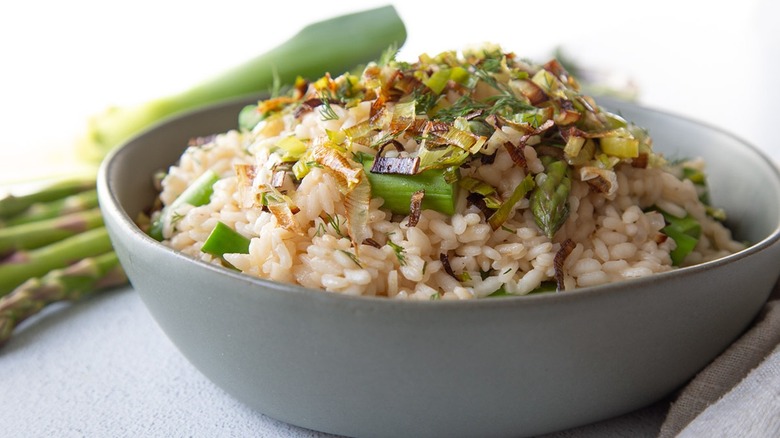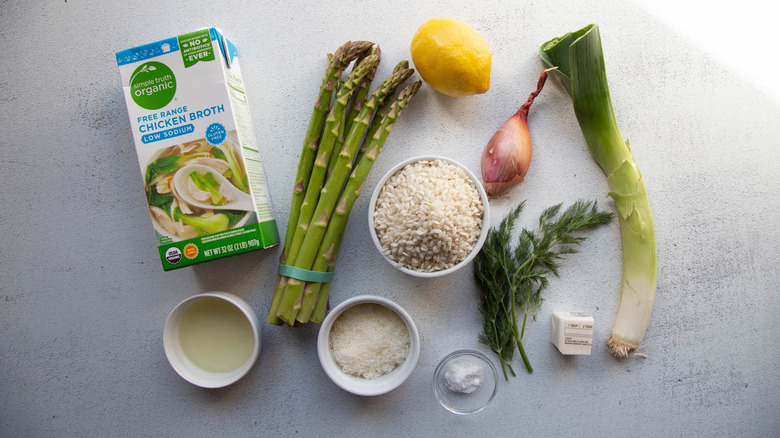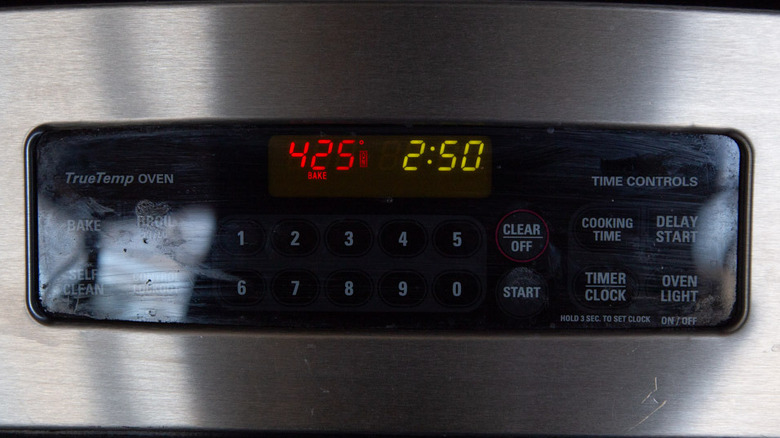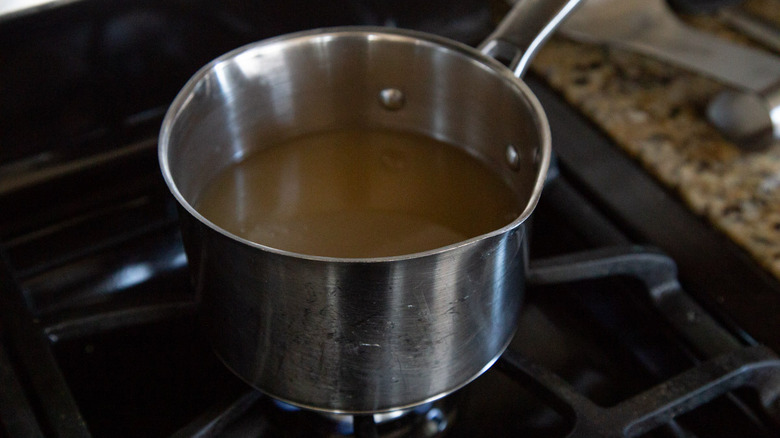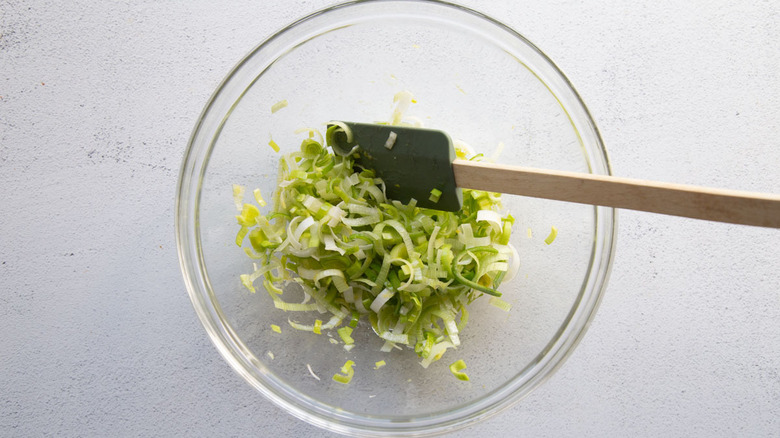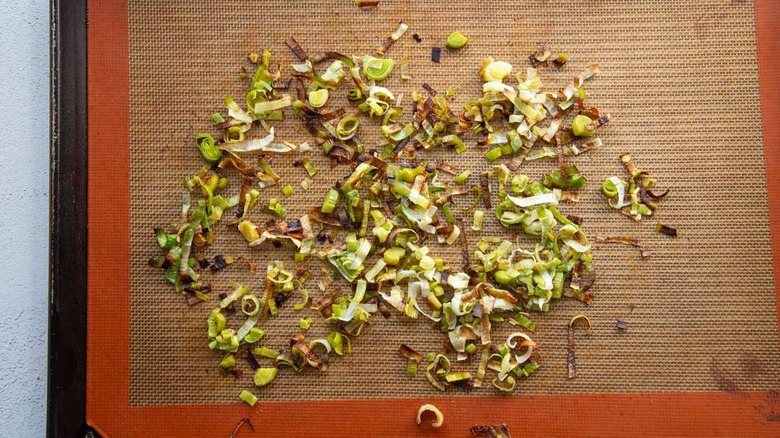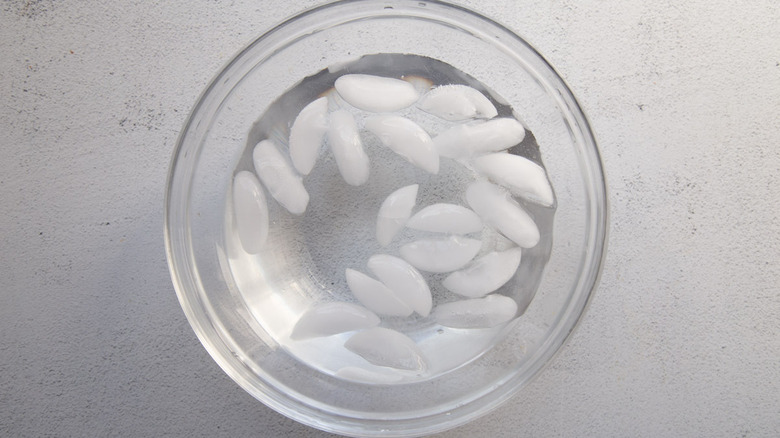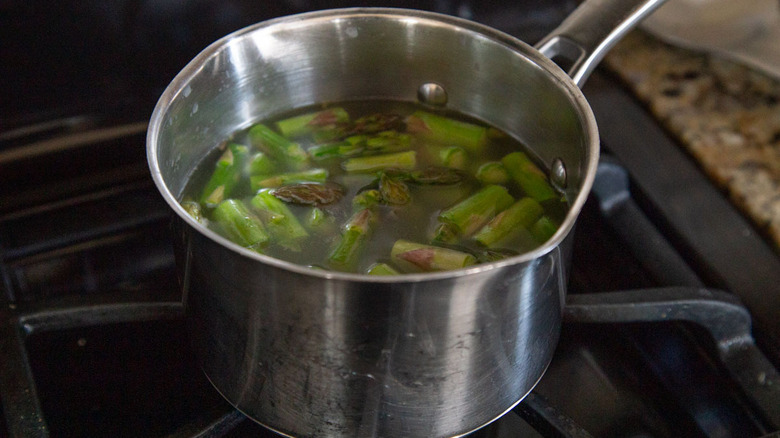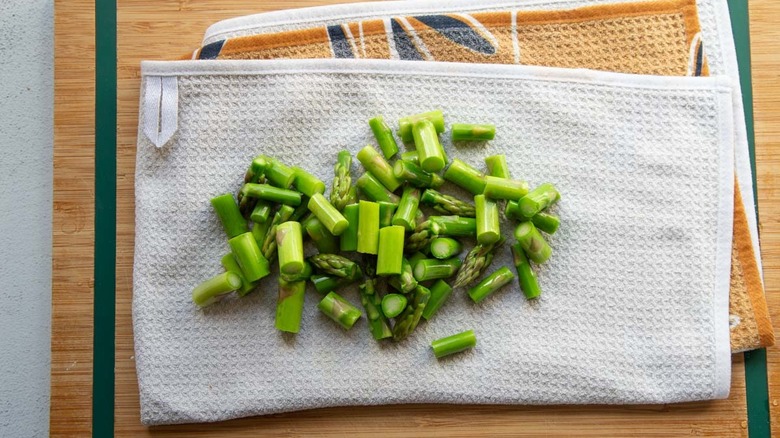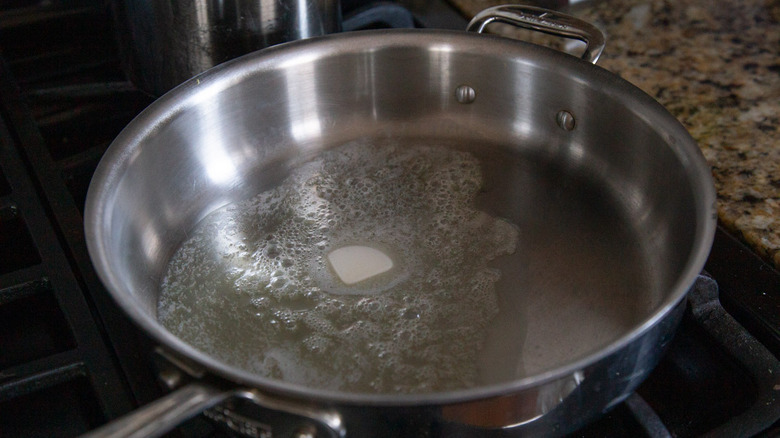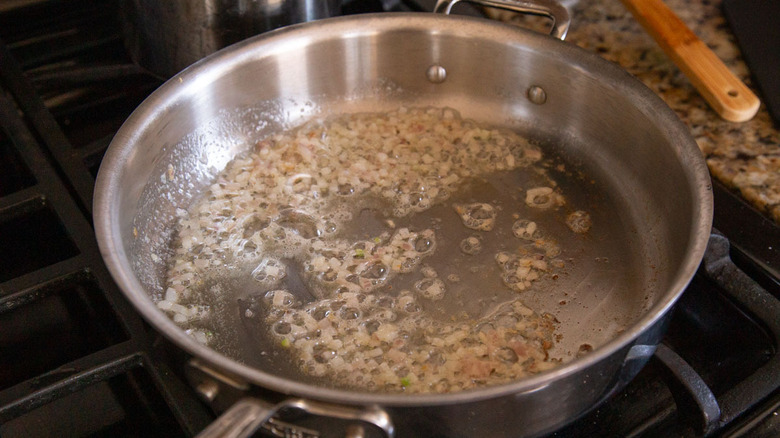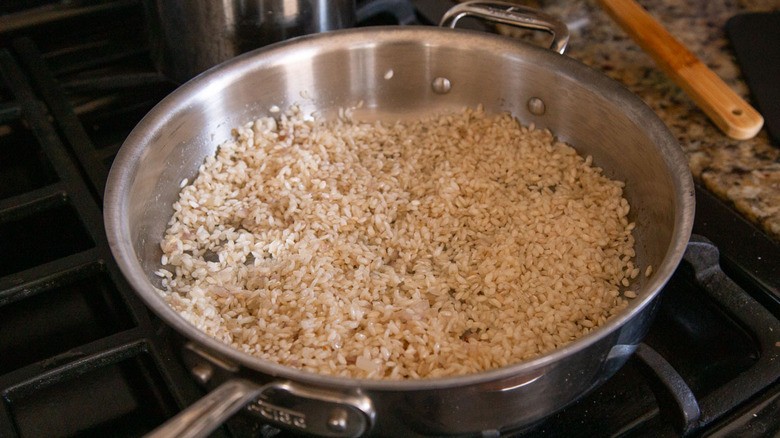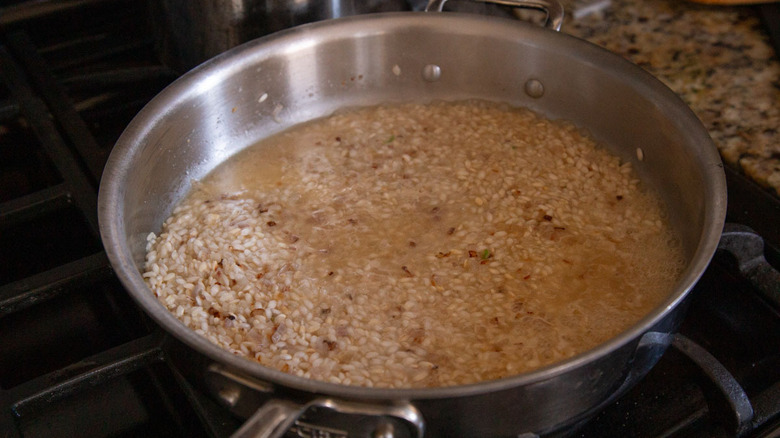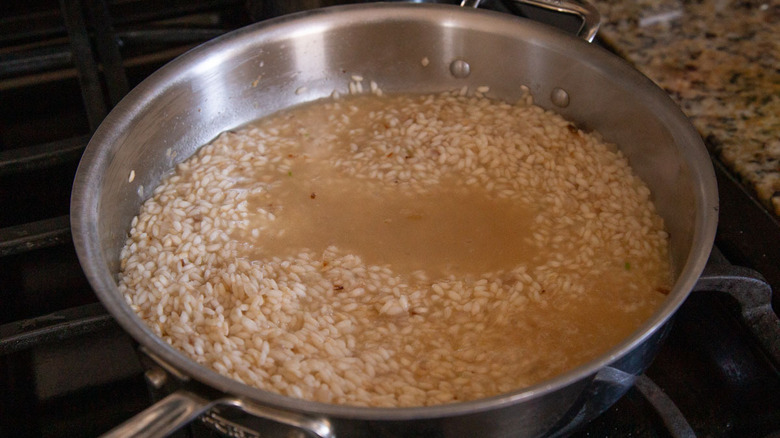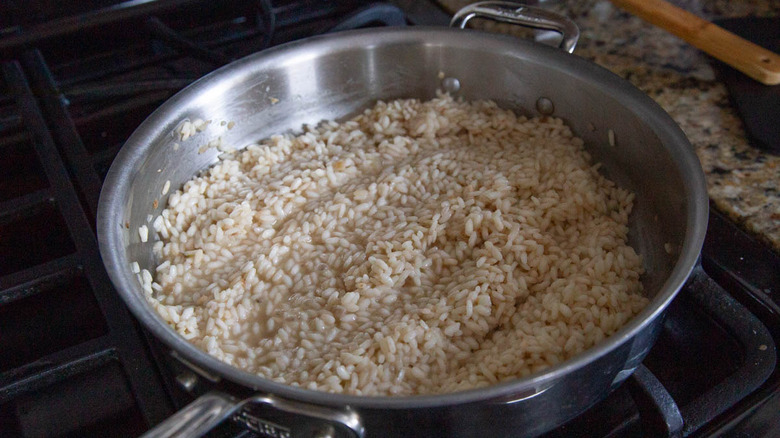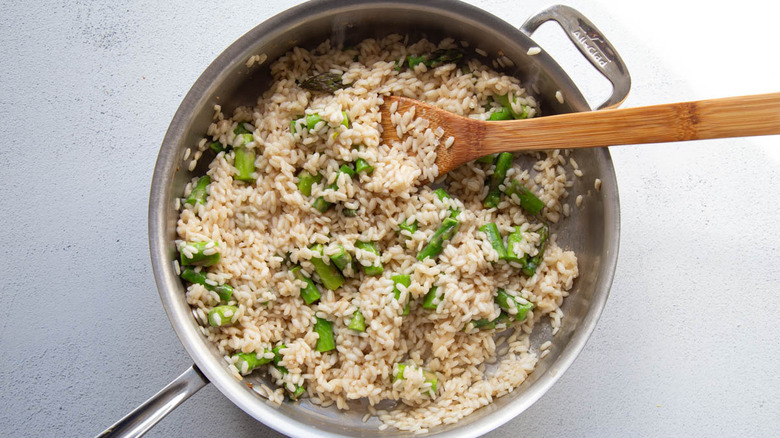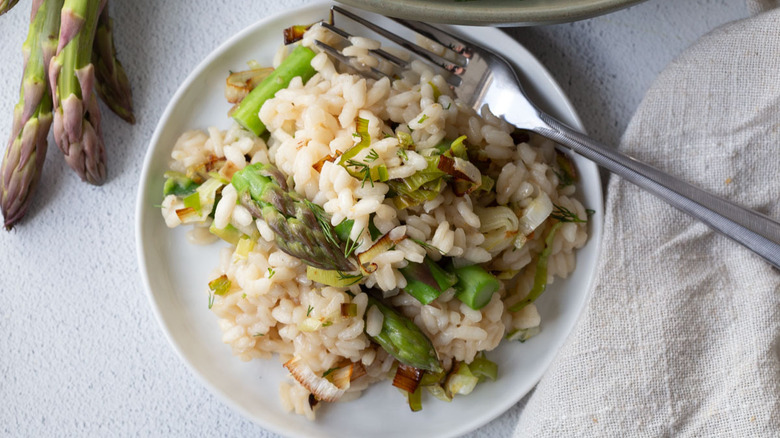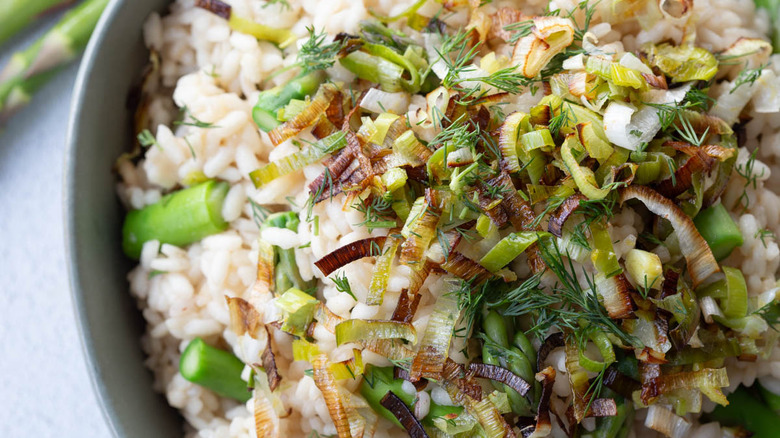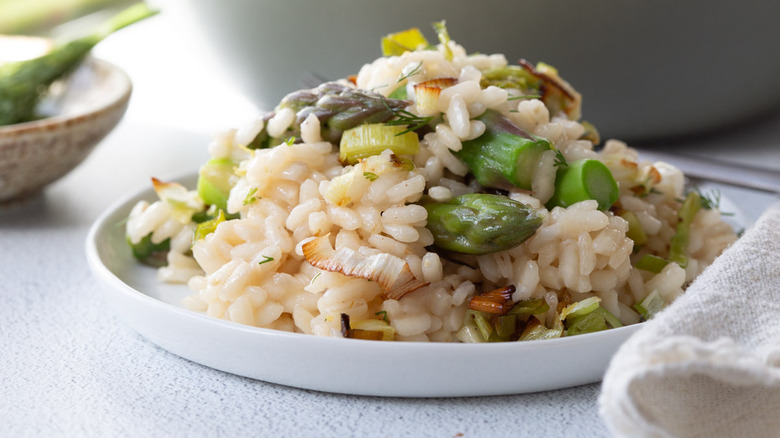Asparagus Risotto With Crispy Leeks Recipe
A creamy bowl of risotto is a treat no matter the season, but when springtime rolls around, it's only right to prepare it with fresh asparagus. Recipe developer Kate Shungu shares this delightful asparagus risotto with crispy leeks, which comes together in under an hour and makes for a delicious weeknight meal or dinner party centerpiece. Cooking risotto might seem like a task best left to the experts, but as long as you're able to stick around the pan for 20 minutes and occasionally stir, you're well on your way to a deluxe dinner.
Shungu describes, "The crispy leeks are a nice texture contrast with this creamy, velvety risotto. They add a mild onion flavor and a pop of citrus (from lemon zest), which complements the asparagus really nicely." With a versatile foundation of rice, this can serve as a main course or side dish with just about any protein. "I love making this on a weekend evening, along with some roast chicken or pork tenderloin, for a restaurant-quality meal at home," Shungu shares. And on top of all that, leftovers will last for a few days in the fridge if you're looking for an easy option to pack for lunch.
Gather the ingredients for asparagus risotto with crispy leeks
For this recipe, you'll need low sodium chicken broth, a leek (halved lengthwise and thinly sliced), lemon zest, salt, olive oil, fresh asparagus (chopped into 1-inch pieces), butter, a small shallot (minced), arborio rice (the type of rice used for risotto), and grated Parmesan cheese. If desired, serve the risotto with fresh chopped dill to garnish.
Step 1: Preheat the oven
Preheat oven to 425 F.
Step 2: Heat up the broth
Place the chicken broth in a small saucepan over medium-high heat. Bring to a slow boil.
Step 3: Toss the leeks with seasonings
Toss the sliced leeks with the lemon zest, ¼ teaspoon of the salt, and olive oil.
Step 4: Roast the leeks
Place on a baking sheet and roast for 14-18 minutes, or until crispy and browned, stirring halfway through.
Step 5: Prep an ice bath
Fill a medium-sized bowl with ice water.
Step 6: Blanch the asparagus
Add the chopped asparagus into the boiling broth. Cook for 2-3 minutes, or until just tender. Using a slotted spoon, remove the asparagus from the broth (we'll use the broth for the risotto — place it back over low heat), and plunge into the ice water for 2 minutes.
Step 7: Dry the asparagus
Remove the asparagus from the ice water and pat dry with a kitchen towel.
Step 8: Melt some butter
Melt the butter in a large saute pan over medium heat.
Step 9: Saute the shallots
Add the shallot and cook for 3 minutes, or until just turning translucent.
Step 10: Toast the rice
Add the rice and the remaining ¾ teaspoon of salt. Cook for 2 minutes, stirring occasionally, to lightly toast the rice.
Step 11: Stir in some broth
Pour in 1 cup of chicken broth. Cook for 5 minutes, stirring occasionally, or until most of the liquid has been absorbed.
Step 12: Add more broth, and stir
Add another cup of chicken broth. Cook an additional 5 minutes, stirring occasionally.
Step 13: Keep stirring in broth until the rice is cooked
Add another cup of chicken broth and cook until mostly absorbed and the rice is tender. If the rice is not yet tender, add the remaining ½ cup of broth and cook until most of it is absorbed.
Step 14: Add cheese and asparagus
Stir in the Parmesan and asparagus.
Step 15: Garnish and serve the risotto
Transfer the risotto to plates and top with the crispy leeks. Garnish with fresh dill, if using, and serve.
How much liquid should you add to risotto?
When making risotto, you'll notice that you need to regularly add liquid so the rice can slowly cook. However, since this technique doesn't call for pouring in all of the broth at once, it can be tricky to determine exactly how much broth you need. It will depend on various factors, such as your pan's heat, so it's good to have some visual cues. Shungu shares, "I learned to make risotto from an Italian chef who grew up in Italy. She said that you should see little puddles of broth in the rice, and that's the perfect amount of broth to start with." Let the rice cook as it soaks up the broth, then "add another ladle of liquid until you see puddles again," Shungu describes.
As for when to stop adding broth, that's all about tasting. Continuously test a few grains of rice with your teeth — once they're tender and no longer sticking between your molars, the risotto is cooked. At this stage, once the rice is just about done, avoid letting all the broth be absorbed. "Leave a little liquid in the pan, so the Parmesan can work with it to create a creamy, velvety 'sauce' to coat the rice," Shungu explains. This consistency is the quality you're aiming for when making risotto.
Why should you blanch asparagus?
Fresh, just-crunchy-enough vegetables always win over limp, overcooked versions, and that's why Shungu recommends blanching the asparagus for this recipe. It might be an extra step, but it's quick, easy, and well worth it. "We want vibrant, crisp-tender asparagus here, so instead of cooking the asparagus with the risotto, where it is prone to overcook, we'll blanch it first and then add it to the rice at the very end," she explains.
Blanching might sound like a fancy technique that belongs at a culinary school, but it's really very straightforward. "Blanching involves cooking a vegetable in simmering water for a few minutes, then plunging it into ice water to stop the cooking," Shungu says. The outcome? "It results in a gorgeous green hue for the asparagus," she adds. Not only is it aesthetically appealing, but it also maintains the vegetable's natural bite, making it far more pleasant to eat alongside the creamy rice.
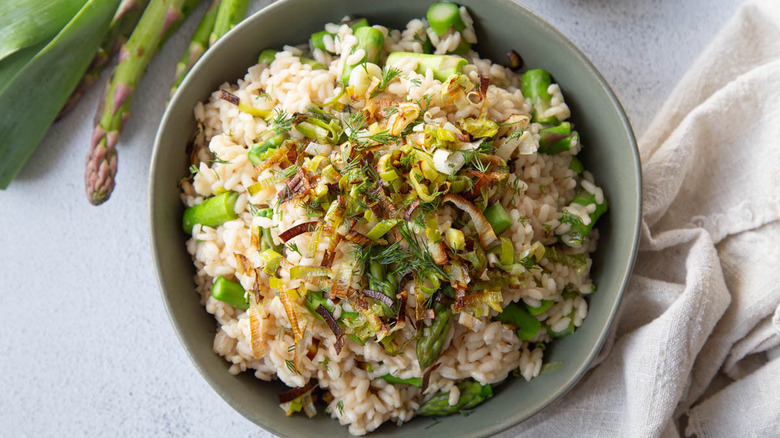
- 3 ½ cups low sodium chicken broth
- 1 leek, halved lengthwise and thinly sliced
- Zest of 1 lemon
- 1 teaspoon salt, divided
- 2 tablespoons olive oil
- ½ pound fresh asparagus, chopped into 1-inch pieces
- 2 tablespoons butter
- 1 small shallot, minced
- 1 ½ cups arborio rice
- ⅓ cup grated Parmesan cheese
- Chopped fresh dill, for garnish
- Preheat oven to 425 F.
- Place the chicken broth in a small saucepan over medium-high heat. Bring to a slow boil.
- Toss the sliced leeks with the lemon zest, ¼ teaspoon of the salt, and olive oil.
- Place on a baking sheet and roast for 14-18 minutes, or until crispy and browned, stirring halfway through.
- Fill a medium-sized bowl with ice water.
- Add the chopped asparagus into the boiling broth. Cook for 2-3 minutes, or until just tender. Using a slotted spoon, remove the asparagus from the broth (we'll use the broth for the risotto — place it back over low heat), and plunge into the ice water for 2 minutes.
- Remove the asparagus from the ice water and pat dry with a kitchen towel.
- Melt the butter in a large saute pan over medium heat.
- Add the shallot and cook for 3 minutes, or until just turning translucent.
- Add the rice and the remaining ¾ teaspoon of salt. Cook for 2 minutes, stirring occasionally, to lightly toast the rice.
- Pour in 1 cup of chicken broth. Cook for 5 minutes, stirring occasionally, or until most of the liquid has been absorbed.
- Add another cup of chicken broth. Cook an additional 5 minutes, stirring occasionally.
- Add another cup of chicken broth and cook until mostly absorbed and the rice is tender. If the rice is not yet tender, add the remaining ½ cup of broth and cook until most of it is absorbed.
- Stir in the Parmesan and asparagus.
- Transfer the risotto to plates and top with the crispy leeks. Garnish with fresh dill, if using, and serve.
| Calories per Serving | 499 |
| Total Fat | 17.5 g |
| Saturated Fat | 6.9 g |
| Trans Fat | 0.0 g |
| Cholesterol | 23.7 mg |
| Total Carbohydrates | 71.3 g |
| Dietary Fiber | 4.6 g |
| Total Sugars | 3.5 g |
| Sodium | 800.1 mg |
| Protein | 15.6 g |
